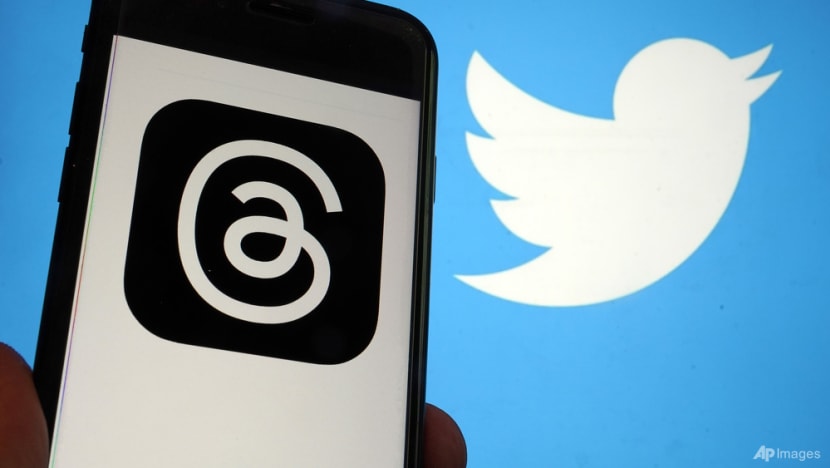Commentary: Meta’s new app Threads puts Twitter under pressure
Meta brought forward the launch of its “Twitter killer” to capitalise on the Elon Musk-owned app’s recent woes, says Dave Lee for Bloomberg Opinion.

NEW YORK: Like guests arriving at a destination wedding, users joining Meta Platforms’ new Threads app on Wednesday night likely found familiar faces in unfamiliar surroundings. “Hey, you made it!” … “Jeff got in an hour ago!” … “Have you met Mary? You’ve probably got friends in common...”
Eventually someone might be brave enough to quietly mutter: “So … do you think it’ll last?”
The dopamine was flowing, that’s for sure. Meta brought forward the launch of its “Twitter killer” to capitalise on the Elon Musk-owned app’s recent woes, delivering a masterclass in onboarding.
Using its existing knowledge of connections made between people on Instagram, the company populated feeds on Threads with accounts users already knew, and others they would perhaps like to. The ding-ding-ding of notifications began almost immediately.
Meta’s approach meant users leapfrogged the disorienting “now what?” moment that has blighted the sign-up process on other Twitter clones. That alone makes Threads a larger threat to Twitter than anything else we’ve seen so far.
Within two hours, according to Meta founder Mark Zuckerberg, 2 million people had joined. Within seven hours of the launch, it was 10 million.
Zuckerberg, clearly relishing the sense he was rescuing Twitter users from the Musk regime, posted his first tweet in more than a decade, poking fun at taking on Twitter at its own game. In all, it may well have been the first day of sincerely positive PR Zuckerberg has enjoyed since 2018’s Cambridge Analytica scandal left his company’s reputation in tatters.
TWITTER STILL A LONG WAY FROM BEING REPLACED
But signups are one thing, staying power is another. The hype around Threads will carry it for the near future, particularly as it gradually becomes more widely available (Meta has held the app back in European markets to ensure regulatory compliance).
Beyond that, things get much more difficult. Twitter is still a long way from being replaced, given there are many reasons it could still be considered the superior platform.
First, Twitter still has vastly more people on it, measured at 238 million “monetisable” daily active users just before Musk took over (he hasn’t updated the number since). Those people have long-cultivated followings and connections they may not want to shake.
Functionality-wise, Twitter’s trending topics, even in their current neglected state, give a feeling of a collective community mood that Threads lacks. Threads doesn’t yet enable hashtags, a key tool for organising and discovering both basic information and social movements, such as #MeToo or #BlackLivesMatter.
Twitter’s audio chatting tool, Spaces, gives the network an additional “live” vibrancy that Threads, despite its launch night energy, might lack.
META’S CORPORATE INSTINCTS
These features could arrive on Threads in good time, perhaps. But the bigger barrier to the app’s success is Meta’s own corporate instincts. Already, Instagram boss Adam Mosseri, who by extension is now in charge of Threads, has said that rather than implement a messaging system, the company will instead encourage private chats via Meta’s other apps.
He says they’re doing that to save people having an “extra inbox” to check. I say it’s to give an engagement boost to Meta’s lame Messenger app. And besides, if a person leaves Twitter, then surely they’re net even on the number of inboxes in their life.
Prior to launch, much was made of the far-reaching data permissions demanded by the Threads app. With Meta still suffering from the knock-on effects of Apple’s privacy changes - which have come at a cost of billions of dollars in revenue - a reasonable cynic might say that Meta’s enthusiasm behind creating Threads comes from the opportunity to plug the gaps in the company’s targeted advertising data.
Users, on the whole, may care little about that. What they will care about, though, is a lack of control over what they see in their Threads feed. Unlike Twitter, there is currently no option to only see posts from people you have chosen to follow. That’s a grossly anti-user move and I hope they change it quickly. Mosseri said adding such an option is “on the list”. It should be at the very top.
The risk is, when Meta tightens the screw on monetisation, Threads might become an unbearable sprawl of ads, influencers and engagement bait. If that happens, Threads could go the way of Facebook Watch, the streaming video platform once dubbed as a competitor to Netflix that ended up a forgotten wasteland of bad content.
But there are some signs that Meta is changing its ways. It has promised to make Threads compatible with the “fediverse”, an open protocol that would allow you to take your Threads username (and followers) and access it all through a different app, one that isn’t owned or controlled by Meta.
To stretch the destination wedding metaphor to its limit - Meta is saying it is comfortable for Threads to have an open relationship with the rest of the internet.
That could be uneasy territory for a platform that for all of its existence has been insistent on keeping everything within its walls, but such moves might help Meta offset regulatory concerns that could arise around it gaining solid ground in yet another area of the social media landscape.
The conclusion from the first night of Threads is this: Seven months on from Elon Musk’s takeover, Twitter is for the first time at risk of losing its status as the watercooler of the internet.














